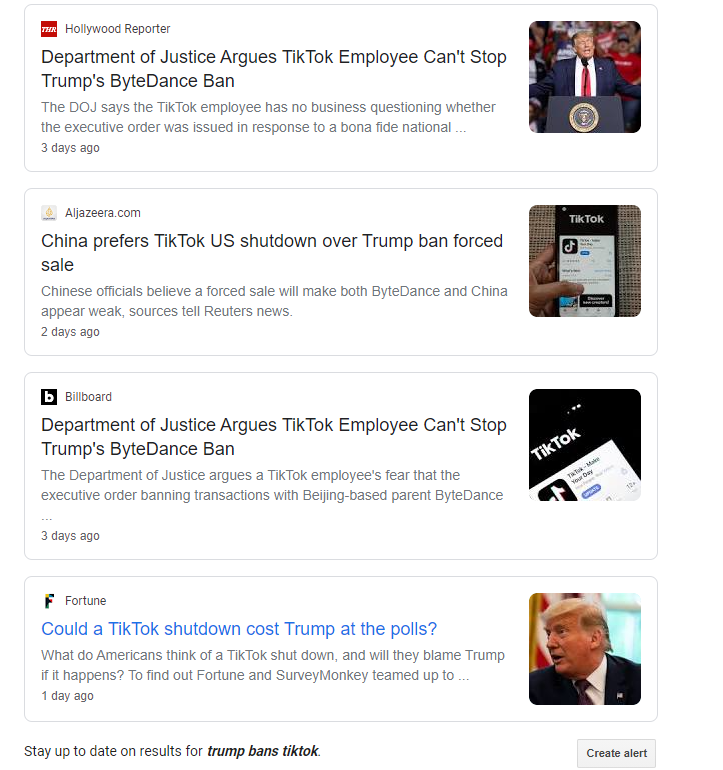There was a flurry of news over the (US) weekend about the future of TikTok in America. There are some pretty big issues at stake here, yet it seems like the focus is on will TikTok the application continue in its current form in the US, or will the 80 million American users need to find a different platform for their digital contests? But can the president ban TikTok?
This post will take a critical look at the news headlines telling us the president is banning TikTok, with a goal of deconstructing these talking points to see what we really need to worry about.
Trump Bans TikTok?
Stories working on the newest updates on potential TikTok mergers are still leading with some variation of a TikTok ban.

Is it even possible for Trump to ban a merger? Does the president have the power to meddle in the merger and acquisition efforts of independent businesses?
Yes.
IEEPA and the President
Via executive order, Trump invoked the International Emergency Economic Powers Act (IEEPA). The IEEPA was enacted in 1977. It gives the president “to regulate international commerce after declaring a national emergency in response to any unusual and extraordinary threat to the United States which has its source in whole or substantial part outside the United States.” [via Wikipedia].
IEEPA is an evolution of the Trading with the Enemy Act (TWEA) that was passed in 1917. If you’ve ever worked for an IT vendor, that list of countries you can’t sell was created using the TWEA. This congressional report looks at the IEEPA and the TWEA and the danger of congress delegating emergency powers to the president to control economic transactions.
Trump isn’t the first to invoke the IEEPA to halt M&A activities, and it’s not even the first time he’s used it. In reality, those simply saying “Trump is banning TikTok” are lazy, and the collective idea that results is dangerous. It doesn’t allow us to open up a conversation about the true danger of IEEPA, as shown by the congressional report linked in the previous paragraph”
As of July 1, 2020, Presidents had declared 59 national emergencies invoking IEEPA, 33 of which are still ongoing. Typically, national emergencies invoking IEEPA last nearly a decade, although some have lasted significantly longer—the first state of emergency declared under the NEA and IEEPA, which was declared in response to the taking of U.S. embassy staff as hostages by Iran in 1979, may soon enter its fifth decade.
The International Emergency Economic Powers Act: Origins, Evolution, and Use
Is TikTok an Unusual and Extraordinary Threat to the US?
TikTok is extremely popular, with an estimated 800 million global monthly active users. However, is it possible this silly app that aims to “bring joy” is a security threat to the US?
Many in our government believe they are. A bill was introduced to Congress on 3/12/2020 to ban TikTok on government-issued devices. Before that, the Army and TSA banned the app. The Army considers the app a cyber threat.
Last October, Senators Schumer (D) and Cotton (R) asked the intelligence community to do a review of data collected on Americans by TikTok, and if the Chinese government could influence data shown to Americans.
According to Senator Rubio (R), who also called for an investigation, China requires moderators of content, even though TikTok does business on servers in US regions. Those moderators ban mentions of topics such as Tienanmen Square, Tibet, Hong Kong, Taiwan, and other issues.
What Happens Next?
This article has very lengthy discussion about all of the main objections to TikTok. It has legitimate points, however many of these same points can be made about Facebook, which happens to be banned in China.
China created new export rules especially for TikTok, saying the sale could not include the algorithm. According to China’s official news agency, “The newly-added article 21 over ‘personalized information push service technology based on data analysis’ and article 18 about ‘[AI] interactive interface technology’ may have something to do with ByteDance (parent company of TikTok,”.
Microsoft’s buy-out deal was rejected. Oracle is said to be in line to be the US “trusted technology advisor“. What does that mean? Will they build a new algorithm that can be decouple from China? Will they run TikTok on the Oracle cloud (and what does that mean for vendors like Dell and VMware that are the infrastructure stack?)?
And what is it about the algorithm that is so attractive to a company like Oracle?
Most of all, what happens if an agreement can’t be made that satisfies the president? Will he be able to use the IEEPA to block the app at the border? This is a very serious possibility, and could change the Internet as we know it forever.
Real Talk
Don’t be lulled into just reading a salacious headline about our current president banning an app the kids love just because it’s based in China, because he dislikes trade from China.
There is so much more to it. Are we right to worry about the Chinese government controlling an application that has an AI that is at least as powerful as the Facebook AI? I think we are.
TikTok may be bring joy, but it also distracts us to what is going on behind the scenes. Tech isn’t always built for good. The algorithm that makes it so addictive is probably working in concert with other algorithms that are using information against you. Be digitally literate – and think different y’all!



One thought on “Why does the President Want to Ban TikTok?”